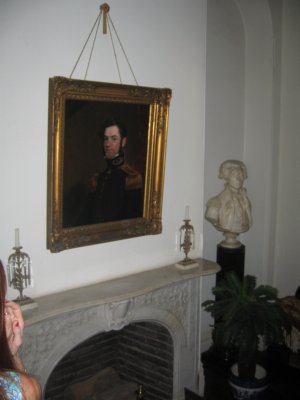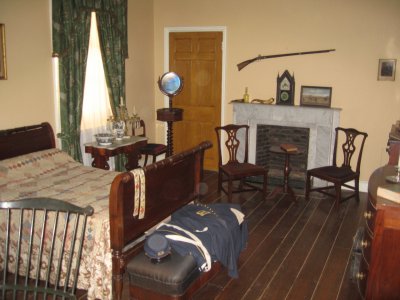July 06, 2005
'WE'VE LOST A MODERN DAY HOMER.'
We've been too absorbed in all things puppy, hurricane, Live (H)8 and Hudson Valley cycling of late.
Reminds me that we overlooked a significant passing last week, that of civil war historian Shelby Foote.

Well, devoted southerner Willie Drye, author of Storm of the Century: The Labor Day Hurricane of 1935, tried to remind us.
Sent: Tuesday, June 28, 2005 5:52 PM Subject: Shelby Foote's deathHi guys:
In a few minutes, when Jane and I sit on the front porch for our daily "sundowner" session, I'll raise a glass of whiskey to the memory of Shelby Foote, who died yesterday.
For a while after the Ken Burns documentary on the Civil War aired on PBS 15 years ago, Foote briefly became something of a minor cult hero. He projected a remarkable presence, calm and as certain of his facts as if he'd been taking notes while he witnessed the whole thing. And he told us the story in that great Southern drawl.
I bought his three-volume history, The Civil War: A Narrative, in 1978, and I've still got the original dust jackets on those books, though they're getting pretty tattered now.
What a magnificent writer this guy was. He took perhaps the most complex, sprawling and important event in our history and turned it into prose that just sort of took you by the hand and led you through the story. It was an amazing feat.
Later,
Willie
I thought about Foote and the effect his work had on me as I toured Arlington National Cemetery two weeks ago.
The cemetery sits on a Virginia hillside rising above the Potomac River and overlooking Washington, D.C. At the pinacle stands Arlington House, a 19th-century mansion with 250,000 military grave sites around it now. When construction began in 1802, the estate was intended as a living memorial to George Washington, was owned and constructed by the first president's adopted grandson, George Washington Parke Custis, son of John Parke Custis who himself was a child of Martha Washington by her first marriage.
George Washington Parke Custis and his wife, Mary Lee Fitzhugh (whom he had married in 1804), lived in Arlington House for the rest of their lives. On June 30, 1831, Custis' only child, Mary Anna Randolph Custis, married her childhood friend and distant cousin, Robert E. Lee. Lee was the son of former three-term Virginia Governor Henry ("Light Horse Harry") Lee and was himself a graduate of West Point.

Lee's West Point portrait can still be seen hanging over a mantle in a first-floor room at Arlington House.
Lee and Mary Anna lived at Arlington House until 1861, when Virginia ratified an alliance with the Confederacy and seceded from the Union.

Lee resigned his Union commission in an upstairs bedroom at the mansion, saying he could not fight against his native Virginia in a war. He would not return to the mansion.
I'm posting all this is because Shelby Foote was the reason I cared. The way he breathed life into history and showed the humanity behind the inhumanity contributed to my appreciation for things like a mansion on a hill above a cemetery.
Then on the Fourth of July, Willie forwarded this notation posted Friday on Slate. I thought it was a rather interesting take:
Our nation's obituarists responded to the death of the Civil War historian Shelby Foote on Monday night by splitting, roughly, into two familiar camps: those above and those below the Mason-Dixon line. Foote was universally recognized for his three-volume history The Civil War: A Narrative, which he published beginning in 1958, and more recently for his star turn in Ken Burns' 1991 PBS documentary. The tenor of the Northern praise was respectful, occasionally admiring, but restrained—at least compared to the Southerners, a number of whom had reverential firsthand tales of droll conversations and shared bourbons with the elegant, puckish Mississippian. One columnist from North Carolina called Foote's history of the Civil War "the Iliad of our nation," while a reporter at the Atlanta Journal-Constitution lamented, "we've lost a modern day Homer." One Washington Post writer boldly ventured that with Foote's passing now the Civil War could "finally be over."Foote, who had a self-deprecating wit and a love of irony, would have surely found these pronouncements amusing. But what is Foote's legacy, anyhow? Were the comparisons to a modern Homer just the result of too many mint juleps?
The academy never wholly embraced Foote (who, for his part, never considered himself a professional historian or a military expert). Some historians complained that Foote didn't pay enough attention to the political and economic factors behind the war. Others were offended that he'd dare to write history without footnotes. Looking back, was it merely a case of Northern empiricism scorning Southern charm? Part of what made Foote so beloved in his native region, and a folk hero for millions of PBS viewers, was that he seemed to embody the Old South: an erudite, liberal-minded Rhett Butler with a Robert E. Lee beard and a courtly drawl.
In reality, Foote, like the Old South, was far more complicated. He was a reasonably successful young novelist who had turned to writing history only because his editor at Random House, Bennett Cerf, suggested that he try his hand at a short centennial history of the Civil War while between novels. That short history ended up taking 20 years and a million-and-a-half words to write — a tad longer than Gibbon's Decline and Fall of the Roman Empire. Foote was also a dyed-in-the-wool Southern aristocrat (his great-grandfather, a Confederate cavalry commander, had his horse shot out from under him at Shiloh but survived), yet he once told me that he ultimately found Robert E. Lee boring. He allowed that he was a Ulysses S. Grant man, a heretical statement for an old-line Southerner to utter — not all that far from, say, preferring Saddam to Tommy Franks.
He also had a maverick view of history. Foote once told a Paris Review interviewer that he subscribed to the Roman belief that "history was intended to publicize, if you will, the lives of great men so that we would have something to emulate." Nowadays, that sounds hopelessly old-fashioned. Apart from the whiff of patriarchy and a notion of self-improvement that sounds quaint to contemporary ears, most modern historians concern themselves with how economic, political, and social systems act upon individuals, not the other way around. Foote came to history out of the tradition of the Southern storyteller, but his achievement as a researcher and archivist shouldn't be overlooked. He wanted to recreate the war in all its immediacy — he went so far as to camp out at battlegrounds on the anniversary of battles so he could capture the exact conditions of fighting.
Of course, Foote had astonishingly rich primary materials at his disposal. As Edmund Wilson wrote in his introduction to Patriotic Gore, the "period of the American Civil War was not one in which belles letters flourished, but it did produce a remarkable literature which mostly consists of speeches and pamphlets, private letters and diaries, personal memoirs and journalistic reports. Has there ever been another historical crisis of the magnitude of 1861-65 in which so many people were so articulate?" Much of the considerable power of Foote's epic comes from the way he — drawing on his novelistic instincts — wove together all the these disparate voices into one seamless narrative.
Here is but one small example. Foote describes Gen. Winfield Scott, the hero of the Mexican War and, at the time, the country's most distinguished military leader since George Washington. Scott has just been unceremoniously relieved of command of the Union Army by Abraham Lincoln, and he's been replaced by his former deputy, the young dandy George McClellan, who, in a Brutus-and-Caesar moment, has just seen his former superior off at the train depot.
McClellan returned to his quarters and his bed. Rising for the second time that morning, he found his mind so impressed by the farewell at the depot a few hours ago that he took time to describe it in a letter to his wife. After forwarding Scott's greetings to her and the new baby, he philosophized on what he had seen. "The sight of this morning was a lesson to me which I hope not soon to forget. I saw there the end of a long, active, and industrious life, the end of the career of the first soldier; and it was a feeble old man scarce able to walk; hardly anyone there to see him off but his successor. Should I ever become vainglorious and ambitious, remind me of that spectacle."
And then Foote adds, as a postcript:
The old soldier had faded away — had gone, in fact, to live for a time at Delmonico's in New York, where he could get his fill of terrapin; "the best food vouchsafed by Providence to man," he called it, admiring a steaming forkful held six inches above his plate.
This scene has tremendous pathos, and the postcript is the kind of quietly devastating flourish one might come across in Chekhov. Foote's epic history is filled with thousands of such small moments. They make the Southern obituarists' claim that Foote's opus is the Iliad of our nation seem not quite as outlandish.
A Foote Note: For those who care - and, hell, especially for those who don't - NPR put together a nifty retrospective, including audio clips of interviews done with him over the years. If you ever came in contact with Foote and his work, you know that hearing his melifluous tones only enhanced the experience. You can hear them by clicking here.
I was watching my Civil War tapes the other night. I adored Shelby's accent; reminds me of my friend's accent (he's from Richmond); so genteel, so rich, so Southern. A classic.
Posted by: cessna at July 7, 2005 08:35 PM